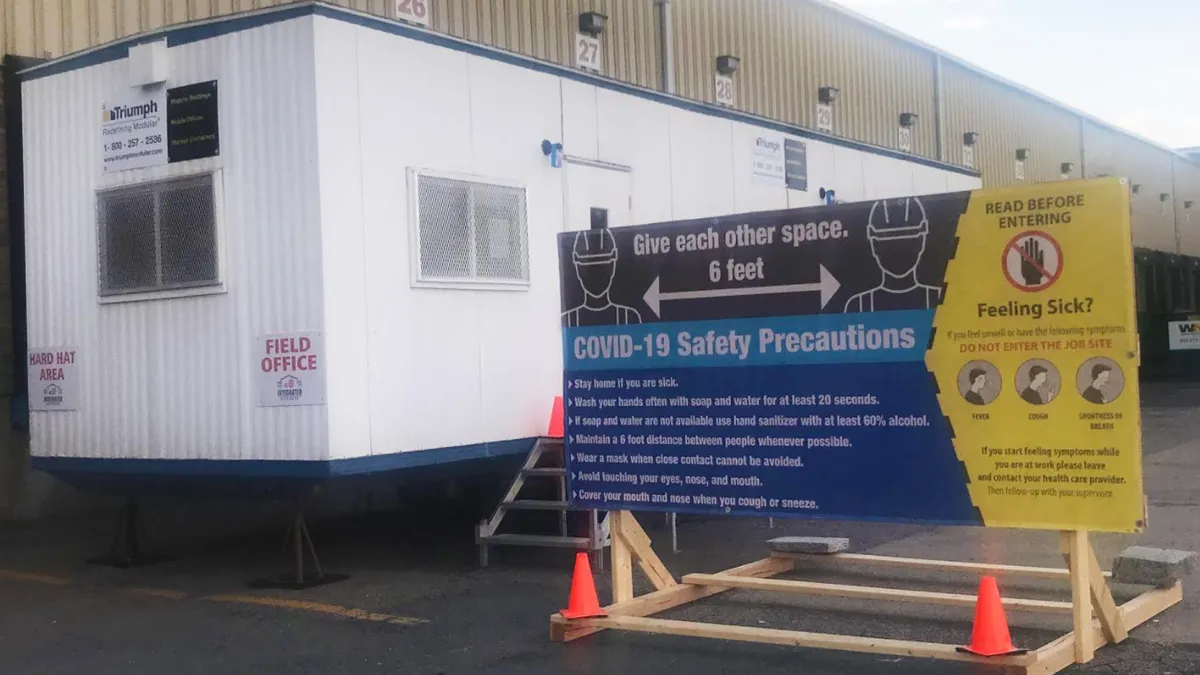Dive Brief:
- A new study confirms and quantifies what contractors across the country already know: Implementing COVID-19 safety preparations and protocols at jobsites has led to a decline in productivity, which is eating into their profits.
- The report from New Horizons Foundation, the research arm of the Sheet Metal & Air Conditioning Contractors’ National Association (SMACNA), found that its members have taken a 17.9% hit to productivity since the outbreak began, resulting in a 7% financial loss, instead of profits, for the average project. It also found that over the course of an eight-hour day, the average worker lost 85 minutes dealing with COVID-19.
- For specialty contractors, a 10% productivity loss can lead to a 100% loss in job profitability, the report claimed, but because it can take as long as three to six months for productivity losses to show up in a company’s financial results, many contractors may not yet realize how much money they’re actually losing to COVID-19. “The magnitude of this issue represents a very real threat to a contractor’s ability to remain in business if left unmitigated,” the study's authors concluded.
Dive Insight:
The study looked at productivity data for more than 113,000 labor hours performed by mechanical, electrical and plumbing contractors from January through May 2020 at commercial construction jobsites ranging from high rise apartments to K-12 school projects, government facilities, food and agricultural installations and hospital bed towers, as well as both new construction and retrofits.
The data showed that taking precautions and performing fit-for-duty checks before contractors enter a jobsite resulted in an 8.7% productivity loss, while following protocols on the job, such as using personal protective equipment (PPE), maintaining social distance from other workers and making sure workspaces and tools are cleaned and disinfected, led to another 9.2% productivity decline.
The report comes at a time when contractors and their subs are already feeling a pinch on profits due to the pandemic. In July, Sweden-based global construction giant Skanska posted a 69% decline in profits that it attributed to coronavirus-related disruptions while the Architectural Billings Index, a widely followed leading indicator of nonresidential construction activity, has seen sequential declines since April, signaling fewer projects to bid on.
Many contractors and their subs have reported anecdotal evidence of productivity losses on jobsites, but the report provides data-based evidence supporting those claims and has ramifications for all sectors of the construction industry. Ken Simonson, chief economist of the Arlington, Virginia-based Associated General Contractors of America (AGC), said the report reflected what he’s seen among AGC members.
“The results are consistent with what I would expect – there are multiple obstacles to maintaining productivity on a jobsite,” Simonson said. “It sounds like a substantial enough database to yield credible results.”
He pointed to similar responses from AGC’s June contractor survey, where 57% of respondents said they had experienced project delays or disruptions as they worked through the COVID-19 pandemic.
In conjunction with the study, SMACNA developed a Pandemic Change Order Calculator that contractors can download from its website for free to take into account these productivity and profitability impacts on their businesses.
To Guy Gast, chair of the SMACNA foundation that sponsored the study and president of the Iowa division of Des Moines, Iowa-based mechanical contractor The Waldinger Corporation, the analysis suggests the results would play out similarly in other trades as well.
“I think there's a pretty good correlation. For example, if you're a carpenter or drywall or framing group, the same processes for fit-for-duty, for entry into the site, for cleaning and sanitation, those protocols are going to be the same," said Gast, who suggested contractors use the data to submit change orders on current jobs and increase estimates going forward. “The real message here is you really need to pay close attention, and put a lot of focus on whether you’re actually hitting your numbers."













